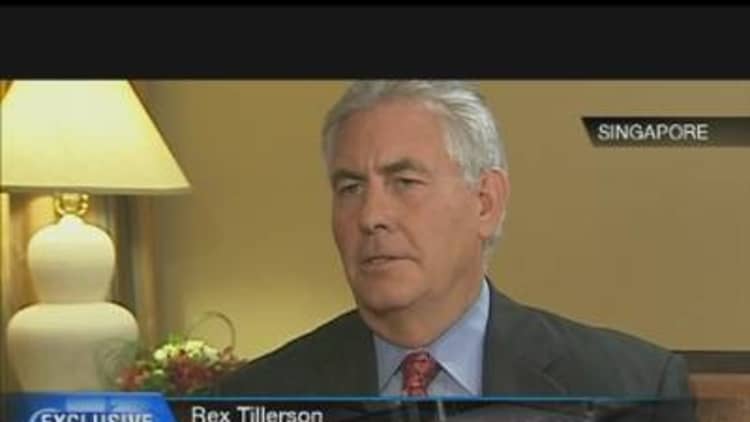The oil market is well supplied, with inventories at record levels globally, and the market continues "to be a bit soft," but prices are getting a big boost from the dollar's fall, Exxon Mobil CEO and Chairman Rex Tillerson told CNBC Friday.
"Inventory levels are at historic highs levels — especially in the U.S.," Tillerson said. But "a foreign exchange effect" is keeping prices higher, despite the amount of oil available.
"If you put the price of oil, which is priced in dollars around the world, and if you look at what some of the currency effects are with the weak dollar — in our view that is contributing about $20-25 a barrel to the price," he said.
The weakness in the dollar is one of the key reasons for this year's move higher in commodities, analysts told Reuters. The greenback's weakness makes dollar-priced commodities like oil and gold more attractive as a physical hedge for investors, analysts said.
Analysts told CNBC higher oil prices and a weaker dollar could affect the global economy's fragile recovery.
"Oil — being a commodity — is a volatile commodity," Tillerson said at the APEC Conference in Singapore.
U.S. crude futures were higher on Friday, trading above $77 a barrel, as the dollar came off its overnight gains.
Oil prices have more than doubled since crashing to lows near $30 a barrel at the peak of the economic slowdown, but they are still nearly 47 percent below their high of $147.27 a barrel struck in July 2008.

But high oil prices have little effect on the company's business plans, Tillerson said.
"We plan and look through this volatility (and) we kind of have a view of where we think commodity prices will act across a range," he said.
A lot of the investments in the industry makes are very long-term in nature, Tillerson said, adding that this is why oil's fall from the July 2008 highs has not had an extreme affect on Exxon Mobil.
Tillerson predicted oil demand from the Asia Pacific region growing at a 1.8 percent rate over the next two decades.
He acknowledged there is steep competition between his company and China in West Africa, where one quarter of Exxon's reserves come from.
"We have to demonstrate the value we have — to the resource owner — the host government," he said. "We have to convince the host government that with Exxon's involvement they are going to actually realize greater value from that same resource than if they undertake a partnership with others."
"The Chinese have a whole lot more money than I have and so I can't get into a bidding war with them and if it all comes down to who will pay the most money, I'll probably lose," he added.
Last month, Exxon posted a 68 percent slump in quarterly net profit to $4.73 billion, or 98 cents per share, which missed Wall Street estimates, as the global recession dented fuel demand.
Exxon Mobil's shares closed 1.4 percent lower at $71.90 on Thursday.

